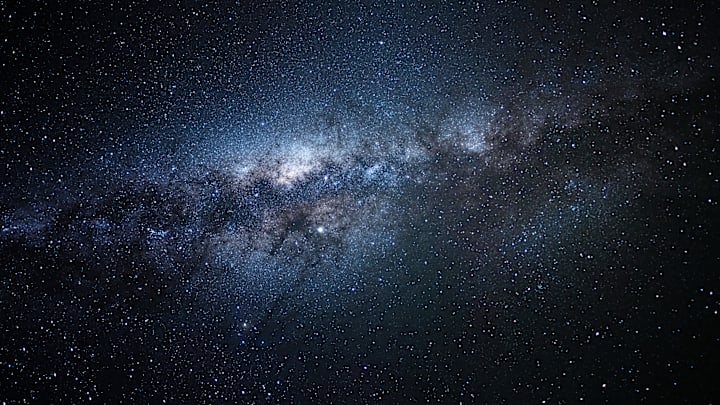You may have heard that space is a vacuum and wondered, “so why doesn’t it suck us off the Earth, like a robot vacuum cleaner sucks dirt off my rug?” The answer goes back to how the universe got started, and how the Earth came to be. Now that Roborock has sent its S8 MaxV Ultra into space, they’re partnering with Mental Floss to break down the answer to this big question.
Defining Vacuum
Before we get into it, though, let’s talk about what a vacuum is and isn’t. A vacuum isn’t really a thing—it’s more the absence of anything at all. So when someone says “space is a vacuum,” what they really mean is that it’s pretty much empty. If you waved a bottle around on a spacewalk and sealed it tight, there probably wouldn’t be a single atom inside of it.
Your robot vacuum maintains a region of empty space, too, but it’s different from the vacuum of space: The dust and hairs are swept into the vacuum by differences in pressure caused by suction.
A Packed Beginning
Space wasn’t always empty. For the first 400,000 years after the big bang, every inch of the universe was packed with a dense, swirling soup of stuff—mostly hydrogen. All these tightly-packed atoms bounced off one another incessantly, keeping the soup incredibly hot at first. But as time went on, space expanded, stretching the soup thinner (like what might happen if you spilled real soup across a table). The thinned-out soup also cooled down and began to congeal.
Thanks to gravity, matter doesn’t like to remain spread out; eventually, everything clumps. The first little clumps of matter formed by pure accident—some patches of space happened to contain a bit more stuff than others. And since all matter has gravity, the more stuff there is in a patch, the more it tugs everything else toward it. Across eons, these puddles of matter collected more matter. Eventually, some clumps reached a critical mass, and their pull became so intense that they rapidly collapsed into stars. The debris they left behind then formed the planets that orbit them. The near absolute vacuum of space was left in the areas between.
Gravity formed the “clumps” we live in, but it’s also what keeps things on Earth from flying off into space. The vacuum of space does exert a pull on the gas in our atmosphere. But just like you can pull your finger out of a vacuum’s hose with a bit of force, the force of gravity is able to keep the air in our atmosphere from getting sucked out into space.
Cabin Pressure
When you’re watching a sci-fi movie and a hole gets blown in the side of a spaceship, everything starts getting sucked out. That’s because the pressure inside the ship is higher than the very low pressure of space, so there’s nothing holding it in to fight the pull of the vacuum. All matter gravitates, but a ship doesn’t consist of enough matter to pull gas in—it takes something as big as the Earth.
Space isn’t actually completely empty. If you waved around a big trash bag instead of a tiny bottle, you might catch a few atoms of hydrogen that managed to escape the gravitational pull of all the stars and planets. And just like the densely packed gas of the early universe was extremely hot, the hydrogen left in space is so loosely packed that it’s freezing cold.
The vacuum of space is also why it’s silent. Sound is just vibration, and without any air molecules to shake, sound can’t travel.
Now, the next time someone mentions the “cold vacuum of space,” you can explain how it got to be such an uninviting place.
Want to take your cleaning beyond limits? Pick up Roborock’s S8 MaxV Ultra. The combination robot vacuum and mop is equipped with a FlexiArm Design Side Brush and Extra Edge Mopping System, which helps it get into corners and other hard to reach areas, ensuring a thorough clean, as well as a voice assistant that will jumpstart cleaning tasks—no WiFi necessary. You can get the Roborock S8 MaxV Ultra on Roborock’s official website.
